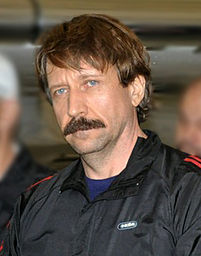
A US court has sentenced Viktor Bout, a.k.a. the “merchant of death,” to 25 years in prison. Much has been written about Bout, who supplied tyrants and terrorists the world over with weapons, often from the former Eastern bloc. It is not surprising to see that the Russian foreign ministry has blasted the sentence, as Bout was first a creature of the Soviet Union and then post-Cold War Russia.
Bout is not an ideologue of any stripe, communist or otherwise, however. At his peak, Bout was an amoral profiteer, willing to sell weapons to anyone who could pay.
The best book I’ve read on Bout is Merchant of Death: Money, Guns, Planes, and the Man Who Makes War Possible, by Douglas Farah and Stephen Braun. They describe Bout thusly:
Bout’s ability to supply his customers with whatever they needed under almost any circumstances — while always keeping his options open — has come to define the Russian entrepreneur and his remarkable career. Unlike his rivals in the underground arms trade, Bout has not been content to live from deal to deal. He is a quintessential big-picture man who understands that organizations, not deals, are the underpinnings of meteoric business success. While most of his Russian countrymen struggled with the strange new complexities of international capitalism — the USSR’s mortal ideological anathema for nearly three quarters of a century — Bout quickly built a flexible, expanding corporate organization that fused the functional remnants of the archaic Soviet system with the West’s fluid, ambition-driven business culture. He built an operation that ranged across continents and hemispheres, carefully scattering planes, handpicked employees, corporate entities, and hidden wealth, creating a formidable empire capable of operating at a moment’s notice in dozens of cities across the world.
Such flexibility allowed Bout to service everyone from al Qaeda and the Taliban, on the one hand, to American military contractors in Iraq on the other.
One of Bout’s first known missions on behalf of an al Qaeda-related entity occurred during the Bosnian War. In 1992, Sudan, which was then a hotbed for jihadism, helped arrange shipments of weapons to the Third World Relief Agency (TWRA), which was arming jihadists in Bosnia.
The TWRA is one of those organizations that defies common myths about al Qaeda and how it has operated. On TWRA’s board sat Wael Julaidan, a co-founder of al Qaeda, and Hassan Cengic, a Bosnian official who served as an Iranian intelligence agent and organized arms shipments from Tehran. Meanwhile, the TWRA received tens of millions of dollars from Saudi sources, including the royal family.
In any event, Bout supplied the TWRA with arms. Farah and Braun quote from a detailed European intelligence assessment that reads:
The TWRA agency had their first big operation in September 1992. They hired a Russian transport plane, from well-known sanctions buster and arms trafficker Victor Bout, out of Khartoum, the Sudanese capital, to transport equipment over to the Maribor Airport marked as humanitarian aid. However, instead of humanitarian assistance, the plane carried over 120 tons of Soviet manufactured rifles, RPG’s, mines and ammunition.
The more you dig into the TWRA, and al Qaeda’s operations in general, the more you realize that Viktor Bout was hardly the only bad guy on the scene willing to have strange bedfellows.
Are you a dedicated reader of FDD's Long War Journal? Has our research benefitted you or your team over the years? Support our independent reporting and analysis today by considering a one-time or monthly donation. Thanks for reading! You can make a tax-deductible donation here.








1 Comment
Seems he’d be more useful outside of prison.